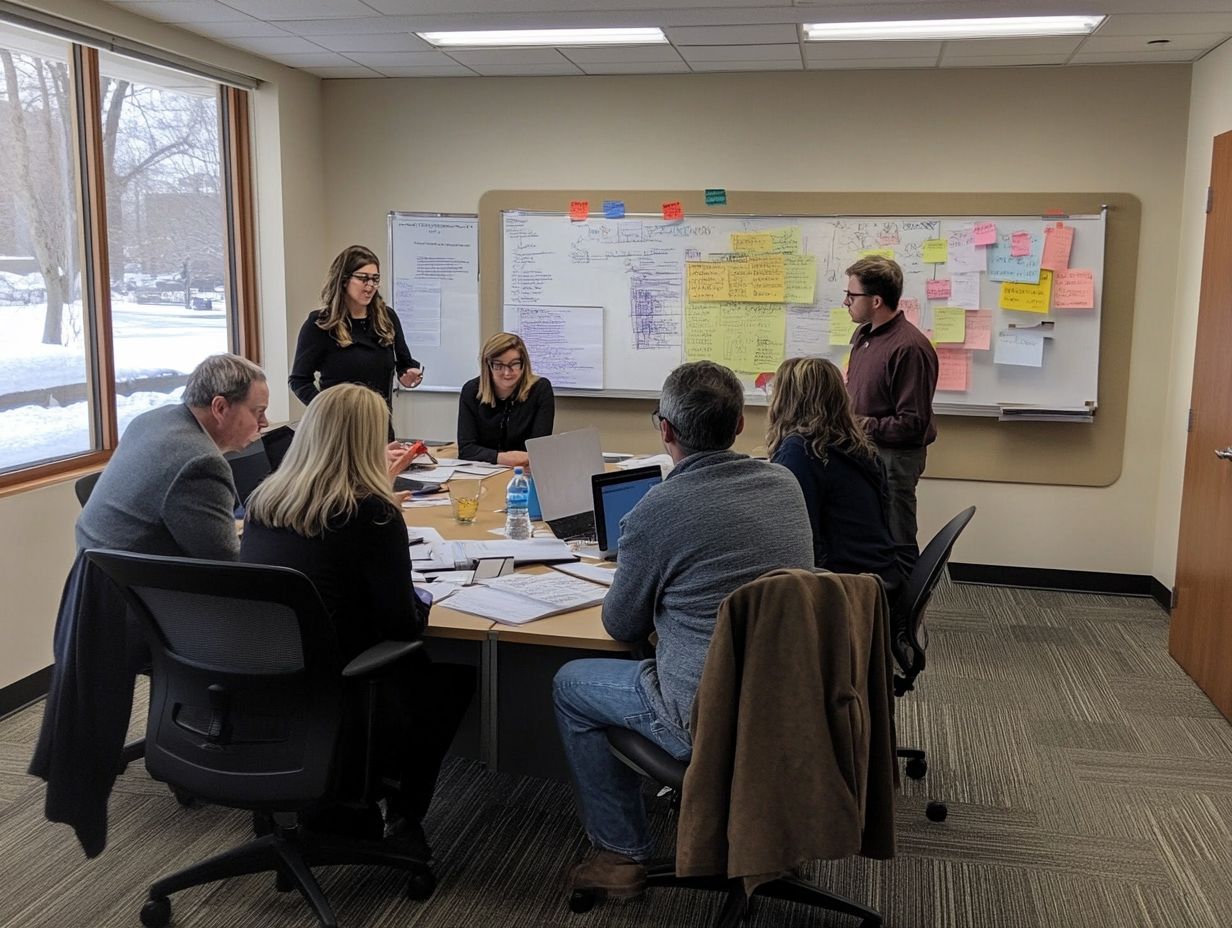5 Ways to Strengthen Your IP Litigation Team
In today s fiercely competitive business environment, the importance of intellectual property (IP) litigation cannot be overstated. A robust IP litigation team is pivotal in protecting your innovations and securing your position in the market.
This article delves into five essential strategies to elevate your IP litigation efforts. From choosing the right team members to harnessing cutting-edge technology, it outlines how to cultivate a dynamic and effective team that can navigate the complexities of IP law.
Explore the challenges you may encounter, the skills required for success, and the myriad benefits of adopting a cohesive approach to IP litigation.
Contents
- Key Takeaways:
- 1. Identifying the Right Team Members
- 2. Creating a Strong Team Dynamic
- 3. Providing Adequate Training and Resources
- 4. Utilizing Technology and Automation
- 5. Developing a Comprehensive Strategy
- What Is IP Litigation and Why Is It Important?
- What Are the Common Challenges Faced by IP Litigation Teams?
- How Can a Strong Team Help with IP Litigation?
- What Are the Key Skills and Qualities of a Successful IP Litigation Team?
- How Can a Business Ensure Their IP Litigation Team Is Effective and Efficient?
- What Are the Benefits of Having a Strong IP Litigation Team?
- Frequently Asked Questions
- What are the benefits of strengthening my IP litigation team?
- How can I assess the current capabilities of my IP litigation team?
- What are some ways to improve the technical expertise of my IP litigation team?
- How can I foster a collaborative and cohesive team dynamic among my IP litigation team?
- Are there any specific tools or resources that can assist my IP litigation team?
- What are some ways to attract and retain top talent for my IP litigation team?
Key Takeaways:

Choose the right team members with diverse skill sets and experience in IP litigation.
Foster a strong team dynamic through open communication, mutual respect, and collaboration.
Invest in training and providing necessary resources to continuously improve the team’s knowledge and skills.
1. Identifying the Right Team Members
Identifying the right team members is essential for cultivating an environment that fosters intellectual property (IP) innovation. This aligns seamlessly with the U.S. patent system.
This endeavor should encompass a diverse range of talents, including women inventors and minority inventors. They bring invaluable perspectives to the innovation economy.
Assembling the right team strengthens patent enforcement and enhances the overall success of corporate transactions and legal strategies surrounding IP protection.
A well-rounded team can nurture creativity, broaden the scope of ideas, and challenge conventional thinking, ultimately driving meaningful advancements.
When you incorporate diverse perspectives, the likelihood of generating patentable inventions increases, reflecting a richer tapestry of experiences and insights.
Being well-versed in skills related to the patent system and IP rights is crucial. It equips your team to navigate the complexities of legal documentation with greater efficacy, ensuring that your creative assets are robustly safeguarded.
This, in turn, leads to more effective enforcement mechanisms that protect innovations, fostering a vibrant ecosystem where new ideas can truly thrive.
2. Creating a Strong Team Dynamic
Creating a strong team dynamic is essential for nurturing innovation in an economy increasingly driven by intellectual property. This means ensuring that all team members collaborate effectively toward common goals.
This synergy is rooted in fundamental elements like effective communication. Open dialogue fosters understanding and minimizes conflicts, paving the way for smoother interactions.
Trust is also a critical component; when you and your team members feel secure in your roles and confident in each other s abilities, creativity has the space to flourish.
Aligning shared objectives ensures that individual efforts contribute to a collective mission, enhancing motivation. In a positive team environment, these dynamics boost morale and significantly impact corporate transactions by streamlining legal strategies.
By leveraging monitoring tools, you can safeguard your intellectual property assets. This creates a robust framework that supports innovation while effectively mitigating risks.
3. Providing Adequate Training and Resources
Providing adequate training and resources is crucial for empowering you and your team to grasp the intricacies of intellectual property rights and enforcement mechanisms with confidence.
This entails comprehensive programs that cover various aspects of IP protection, including the recognition of trademarks, copyrights, and patents essential pillars for any forward-thinking organization.
Understanding the processes behind legal documentation can significantly streamline your operations and mitigate potential legal risks.
By incorporating awareness training, which underscores the importance of safeguarding intellectual assets, you and your colleagues will become more vigilant and proactive.
As a result, these educational resources strengthen your organization s risk assessment capabilities and enhance its competitiveness in the fast-paced innovation economy.
This strategy will help you outpace your competitors while cultivating a culture of responsibility and care for your intellectual property.
4. Utilizing Technology and Automation

Using technology and automation is key for your team. It allows you to streamline processes related to managing and enforcing intellectual property (IP) while enhancing data security.
By leveraging advanced software tools, you can monitor infringements in real time. This enables quicker responses to potential threats.
These tools help identify unauthorized use and automate tedious legal documentation that traditionally consumes countless hours.
Integrating these technologies into your daily operations boosts productivity. Your team can focus more on strategic initiatives rather than being bogged down by repetitive tasks.
In today s digital landscape, robust data security measures are vital for safeguarding IP rights. This ensures your innovative ideas remain protected against exploitation.
5. Developing a Comprehensive Strategy
Developing a comprehensive strategy is essential for your organization to leverage intellectual property effectively. This secures a competitive edge in today s fast-paced innovation economy.
By honing a well-structured legal strategy, you can streamline patent application processes. This helps navigate the often convoluted landscape of patent rights with ease.
Crafting effective licensing contracts is crucial. These contracts not only safeguard your interests but also encourage collaborations that drive growth!
This strategic approach promotes inclusivity by supporting minority and women inventors, contributing to a richer, more diverse environment.
As you maximize your intellectual assets, you fuel economic growth. This creates new opportunities and pathways for innovation in the marketplace.
What Is IP Litigation and Why Is It Important?
Intellectual property (IP) litigation is the legal process you navigate to enforce patent rights and safeguard creative assets from infringement. It is a cornerstone of a thriving innovation economy.
Understanding complex legal frameworks is essential in this process. You need to respond effectively to any violations.
The significance of IP litigation lies in its power to protect unique inventions and designs that fuel economic growth both in the United States and globally.
In today s fast-paced technological landscape, the stakes have never been higher. Individuals and companies invest substantial resources into developing new ideas and products. It is essential for you to grasp the nuances of potential disputes.
A successful IP litigation strategy reinforces the idea that creativity deserves recognition and protection. It cultivates an atmosphere ripe for further innovation.
The consequences of patent infringement can be severe. They can lead to financial setbacks and weaken your competitive position in the marketplace.
Therefore, a robust litigation framework is crucial. It upholds the integrity of intellectual property rights, fostering economic advancement and nurturing a vibrant culture of invention.
What Are the Common Challenges Faced by IP Litigation Teams?
IP litigation teams encounter various challenges. These range from the intricate web of patent infringement cases to the complexities of the litigation process itself, making it crucial to understand how to handle IP litigation as a plaintiff.
Gathering substantial evidence is often daunting. It requires time and resources that can stretch your capabilities.
Meticulous documentation and expert testimonies are essential for building a compelling case. As costs can escalate quickly due to extensive research and prolonged legal battles, managing your budget becomes a pressing concern.
Dealing with the opposing party complicates the process. It demands strong negotiation skills and strategic foresight.
Utilizing advanced monitoring tools greatly enhances your ability to identify infringements swiftly. When paired with a well-defined legal strategy, these resources empower you to mitigate risks and position yourself advantageously against potential challenges.
How Can a Strong Team Help with IP Litigation?

A strong team can dramatically boost IP litigation. By combining diverse perspectives and legal expertise, they create robust systems for monitoring infringements and understanding how to conduct a successful IP litigation trial.
When people with different backgrounds unite, they can tackle challenges efficiently. Working with an intellectual property attorney provides insights into the complexities of IP law.
Using advanced technology tools for tracking infringements streamlines monitoring and provides useful data to strengthen your case.
This collaboration enhances your approach to litigation and increases your chances of a favorable outcome.
What Are the Key Skills and Qualities of a Successful IP Litigation Team?
A successful IP litigation team possesses essential skills. Look for a deep understanding of legal strategy and effective training for employees, along with insights on ways to strengthen your trademark.
They should also have strong analytical thinking skills to address complex legal issues and develop sound solutions.
Strong communication is vital for clear interaction with clients and stakeholders. Effective negotiation tactics empower the team to secure favorable outcomes and build lasting relationships.
Continuous training keeps the team updated on the latest IP law developments, preparing them for evolving challenges.
How Can a Business Ensure Their IP Litigation Team Is Effective and Efficient?
To ensure your IP litigation team is effective, invest in the right tools and training. Additionally, understanding the importance of a strong IP policy in litigation can help you focus on corporate transactions and essential legal documentation.
Establishing clear guidelines helps create a cohesive unit that minimizes misunderstandings and boosts productivity.
Implementing structured workflows allows team members to navigate their responsibilities easily. This keeps everyone aligned with your company s goals.
Utilizing monitoring tools helps track progress and outcomes, providing valuable insights for informed decisions.
Well-defined licensing contracts are crucial for protecting your intellectual property rights. This allows your team to operate confidently and legally.
What Are the Benefits of Having a Strong IP Litigation Team?
A strong IP litigation team offers numerous advantages. It protects your intellectual property rights and can help you implement 5 ways to strengthen your trade secret protections, supporting economic growth.
This expertise strengthens your business’s innovations and improves efficiency in handling legal challenges. By streamlining processes, you can redirect resources towards innovation and market expansion.
A prepared IP team adapts quickly to changes in regulations, ensuring compliance and minimizing risks.
Consider notable cases like a major technology firm’s successful patent infringement litigation. These examples show the real benefits of having a capable team, securing financial rewards and strengthening your market position.
Frequently Asked Questions

What are the benefits of strengthening my IP litigation team?
Strengthening your IP litigation team can lead to more successful outcomes in legal disputes. For insights on enhancing your preparation, consider reviewing how to prepare for an IP litigation case. It also increases efficiency and improves overall performance.
How can I assess the current capabilities of my IP litigation team?
Review past cases and outcomes to assess your team’s capabilities. Also, gather feedback from clients and colleagues to evaluate their knowledge and experience in intellectual property law.
What are some ways to improve the technical expertise of my IP litigation team?
Provide specialized training in areas like patent law and copyright law. Encourage your team to attend exciting conferences and workshops to stay updated on the latest developments in intellectual property law.
How can I foster a collaborative and cohesive team dynamic among my IP litigation team?
Create opportunities for team building and open communication. Encourage collaboration on cases and appreciate each member’s unique strengths.
Are there any specific tools or resources that can assist my IP litigation team?
There are numerous software programs and case management tools designed for IP litigation teams. Tools like IPfolio and Anaqua can streamline your processes and improve your team’s efficiency.
What are some ways to attract and retain top talent for my IP litigation team?
Offer competitive salaries and benefits to attract top talent. Provide career growth opportunities and foster a positive and supportive work environment.






